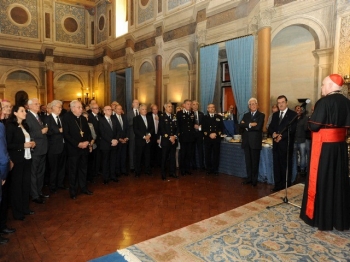The Feast of Our Lady of Palestine and the meeting of the Grand Magisterium

On the evening of October 24, the vigil of the Feast of Our Lady of Palestine, Cardinal Edwin O'Brien - surrounded by members of the Grand Magisterium - delivered the highest recognition of the Order, the Collar, to the new Governor General, the Ambassador Leonardo Visconti di Modrone. Monsignor Antonio Franco received the decoration of Knight of Grand Cross and the Golden Palm of Jerusalem as well as the decree with which he is now appointed Assessor of Honor of the Order from the hands of the Grand Master. The Grand Master also awarded the Golden Palm of Jerusalem to Professor Giuseppe Dalla Torre del Tempio di Sanguinetto, Knight of the Collar, nominating him Lieutenant General of Honor.
The following morning, October 25, to liturgically celebrate the Patroness of the Order, a Mass was celebrated by Cardinal O'Brien at the tomb of the Apostle Peter, in the presence of all the participants in the Autumn Grand Magisterium meeting who carried the prayer intentions of the inhabitants of the Holy Land in their hearts.
During this Mass, concelebrated by Monsignor Pierbattista Pizzaballa, Apostolic Administrator of the Latin Patriarchate of Jerusalem, the Grand Master invited the members of his supreme council not to lose sight of the Heavenly Jerusalem which is built mainly thanks to the sanctity of “every living stone,” as all baptized are called to a precise mission in God’s vast plan where everyone has their place. In the late afternoon, Cardinal O'Brien received his guests in the halls of the Palazzo della Rovere, first among whom Secretary of State Cardinal Pietro Parolin.
During these two days of fraternity and gathering, members of the Grand Magisterium also worked on a very dense agenda.
The Governor General shared his experience of his official trip to the Holy Land at the end of the summer, rejoicing in the welcome received by the new pastoral and administrative team organized by Msgr. Pierbattista Pizzaballa. The smiles on the faces of the young people he met has strengthened his will to commit himself to developing the Order's action in the service of dialogue and coexistence in the Holy Land. Governor General Visconti di Modrone expressed his desire to establish priorities and to promote synergies, as well as to visit all the Lieutenancies during his mandate, with an emphasis on the importance of following the formation of new members.
Msgr. Pizzaballa, just over a year in his duties, shared some important novelties, including the creation of a new pastoral office of the Patriarchate, primarily responsible for family issues. He also made known the administrative changes, in particular the arrival of Palestinian Christian Sami El-Yousef as the first layman in charge of financial issues in the diocese.
Speaking about the difficulties, he mentioned, for example, the ongoing negotiations with the Israeli Ministry of Education on the topic of subsidies to Catholic schools in Israel, and the problem in Jerusalem of Christian property whose sale in some cases threatens the equilibrium established by the Status quo. "Christians of different confessions seek to remain united in this unfavorable context," the Archbishop stressed.
Sami El-Yousef later provided a clear account of the management of the Latin Patriarchate - announcing a nearly $ 13 million budget for 2018 - explaining that he wants to empower people at all levels in order to advance on the path of transparency. The audit carried out by Deloitte is an essential point of reference for new operational and professional procedures that will facilitate the control of the deficit. In addition, a qualified lawyer will soon be chosen to advise the Patriarchate that extends over a vast territory - Cyprus, Israel, Palestine, and Jordan - since education in particular is subject to the laws of different jurisdictions.
Sami El-Yousef noted that 80% of the Patriarchate's budget concerns schools, with nearly 20,000 students but less and less Christians. A combination of factors explains this drop such as the fact that in schools that do not offer all levels of education, it is not possible to complete the entire educational process. The Patriarch hopes, therefore, to strengthen existing structures rather than to create new ones. With regards the Beit Jala Seminary, where future priests are formed, and other pastoral institutions the economic situation is positive.
Engineer Piercarlo Visconti presented the Grand Magisterium's budget, underscoring the great generosity of Germany and Italy, which lead donations after the United States. Asset management, as Dr. Saverio Petrillo explained in detail, gives the Grand Magisterium the security of a "reserve" from which it can draw funds for unexpected expenses.
On behalf of the Grand Magisterium’s Holy Land Commission, Professor Bartholomew McGettrick, explained that the increase in teachers' salaries in order to assure the quality of teaching in the schools of the Patriarchate, is a continuous effort destined to last and to increase in the years to come. He then summarized ongoing projects concerning the school and parish house in Jaffa of Nazareth, Israel, as well as the church of St. Paul in Jubeiha, Jordan, where Engineer Adolfo Rinaldi went on an inspection mission this fall. The project of mosaic and craft workshops - to give work to Christian refugees from the Middle East in Jordan - attracted the attention of the Grand Master, who asked the Order to step up its communication of this subject.
Chancellor Alfredo Bastianelli pointed out that the Grand Magisterium’s communication media are increasingly sharing the initiatives that may interest all Lieutenancies. He gave an example of the innovative App created by the Lieutenancy for Switzerland thanks to which the Members Directory is automatically updated.
Lastly, discussions turned to the upcoming Consulta in November 2018, which is being coordinated by Lieutenant General Agostino Borromeo, on the mandate of Cardinal O’Brien. This five-year event will be the occasion to study the new constitution of the Order, soon to be approved by the Secretariat of State of the Holy See.
François Vayne
(8 November 2017)













